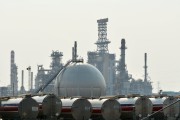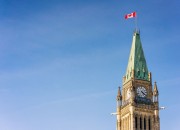If you’re like me, you worry that British Columbia’s government is rushing its pursuit of liquefied natural gas (LNG) development without taking the time to think through and manage the consequences, both social and environmental. The province’s new LNG awareness quiz doesn’t ease those concerns.
The quiz includes some “must-have information” for British Columbians interested in the LNG future that has Premier Christy Clark so excited. My personal favourite is the quiz’s second question:

There’s plenty more if that whets your LNG awareness appetite. Wondering why natural gas is considered clean? Check. Looking for reassurance that everything will be fine in the event of an LNG spill? You’re covered. Wondering how awesome LNG will be for B.C.’s economy? Look no further.
There aren’t any questions on how LNG may lead to world peace, cure cancer or solve the Caramilk secret, but I’m sure those are coming in future iterations.
Jokes aside, this is a pretty depressing effort at education — if that’s what the government was actually interested in doing. An effective effort to increase collective awareness about LNG, which is how Natural Gas Development Minister Rich Coleman describes the initiative’s intent, would tell the full story.
If LNG is coming to the province, there will undoubtedly be benefits, as the quiz goes to great lengths to explain. But there will also be significant social, economic and environmental challenges. Whether it’s cost overruns and labour shortages that Australia’s LNG industry has grappled with, or Alberta’s reputation as an environmental laggard thanks to the oilsands, there’s no shortage of examples of what could be ahead for B.C.
In the spirit of looking at the full costs and benefits, here are a few questions I would like to see in future editions of the quiz:
- If major LNG development compromises B.C.’s carbon pollution reduction targets, what happens to the province’s climate change strategy?
- Faced with a significant increase in shale gas wells and the associated hydraulic fracking, how will the province safely manage water resources in northeast B.C.?
- What is the province doing to ensure B.C. has a vibrant economy when we can’t, or decide not to, rely on LNG as an economic saviour?
- What will the network of pipelines, roads, wellpads and seismic lines needed to supply LNG facilities mean for the already stressed ecosystems in northeast B.C.?
Whatever your views on LNG, these questions all deserve to be addressed in a serious way by our government. Unlike in the province’s LNG quiz, however, there are no easy answers.









